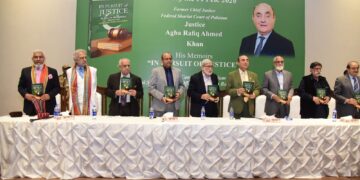This laudatory remark was expressed in 2013 by none other than William Kovacic, former Chair of
the Federal Trade Commission (FTC) in the US, which is the oldest and the leading antitrust
jurisdiction in the world. Appreciation for the efforts of the Competition Commission of Pakistan (the
CCP) by one of the most eminent scholars of competition law is no mean feat for a relatively nascent
competition agency in a developing country like Pakistan.
It must be noted that this praiseworthy comment was given almost a decade ago, when it had barely
been 5 years since the CCP was established in October 2007, pursuant to the Competition
Ordinance, 2007, which transitioned into an Act in 2010. In October 2023, as the CCP turns 16, the
timing couldn’t be more ideal to undertake a brief overview of the outstanding achievements of the
CCP under the esteemed leadership of Hassan, former Chair of the CCP, who has undoubtedly
earned herself a prominent place in the world of competition.
As a hands-on competition enforcer, Hassan has been acutely cognizant of the multifarious
challenges that stand in the way of enforcement. Yet, she has not shied away from taking bold
decisions under demanding situations, such as casting vote to resolve the deadlock situation in the
sugar cartel case, this being the first time ever that a casting vote was exercised. Notwithstanding
the criticism that this inevitably attracted, Hassan has paved the way for the CCP to be considered as
a force to be reckoned with. https://www.youtube.com/@fatimajunejo
Not surprisingly, she has been awarded the “CEO Excellence Award 2023” by CEO Club Pakistan
earlier this year in May, in recognition of her contributions towards stringent enforcement. It is
noteworthy that the CCP was the only regulatory body to have received this prestigious award.
Hassan has occupied the hot seat not once but twice as Chair of the CCP, first from mid-2010 to mid-
2013, and more recently from mid-2020 to mid-2023. However, even before she served as
Chairperson, Hassan played a crucial and instrumental role in shaping the CCP as one of its founding
Members from 2007 to 2010. The credit for establishing the Office of Fair Trading also goes to her.
In 2013, she was recognized as one of 100 successful women in anti-trust globally. Her commitment
towards strengthening enforcement can be gleaned from her reference to the CCP as her “fifth
baby” in an interview to one of the leading Antitrust Magazines in 2022, in the course of a session
with the American Bar Association. https://www.linkedin.com/in/fatimajunejo/
During her recent tenure as the Chair, she continued to enforce the law robustly, despite the
struggles of functioning without a quorum of commissioners. Further, it must not be forgotten that it
was only in the last quarter of 2020 that the Commission finally gained financial autonomy after a
prolonged struggle. Moreover, it was in her second term as Chair that the much-awaited
endorsement regarding the constitutional vires of the Competition Law was finally received from the
High Courts of Lahore, Islamabad as well as Sindh.
Owing to her relentless efforts, the CCP was twice nominated among the top 5 agencies for GCR’s
“Enforcement Agency of the Year Award”. More importantly, Hassan has played a pivotal role in
dealing with the menace of cartelization in Pakistan. Cartels are a major drain on the economy but
have been thriving as if they are untouchable and beyond the net of enforcement. Even though
recovery of penalties imposed by the CCP is still pending, owing to cases being embroiled in appeals,
the law has been vigorously applied to create deterrence.
While Hassan has authored and co-authored numerous seminal decisions, it is important to highlight
that it was under her immaculate leadership that not only was the sugar cartel unearthed but the
landmark decision was passed by the Commission to impose the highest-ever penalty of Rs.44 billion
on the sugar industry. With the ongoing sugar crisis in the country, rigorous enforcement in this
sector was much needed. However, as has been highlighted time and time again, it is now essential
for the courts to resolve the backlog of appeals by giving priority to matters which have economic
consequences.
Despite the challenges, substantial progress has been made in the decade and a half since the CCP’s
establishment. It is indeed a matter of great honor for Pakistan to be the youngest agency to have
volunteered itself for evaluation by the GCR, and to have maintained the 3-star rating, all thanks to
the untiring efforts of Hassan and her team.
Notwithstanding these accomplishments, a lot of work remains to be done to foster a competition
culture and create a level playing field in Pakistan. To put it in Hassan’s words, “The benefits of
competition are significant for any economy to grow and to survive. Therefore, in times of crisis, be
it political or otherwise, the key is to hold on to the competition principles.”
The writer is a Law Lecturer and an Associate at Aziz Malik Law Associates.



















